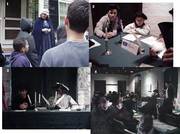Benefits of using Role Play in the Classroom
Things Students Can Learn Beyond the Lesson
- It Encourages Teamwork
- It Encourages Reading and Research
- It Encourages Positive Social Interaction
- It Encourages Creative Expression
- It Stimulates Imaginations
- It Makes Learning Interactive and Fun[1]
[1] Scott Kurtz, “5 Reasons Your Kids Should Play Dungeons and Dragons,” Pvponline, 2005, [Internet]; available from http://www.pvponline.com/rants_dd.php3 (accessed 20 June 2007).
Different is Good
For many students in Middle School and High School, classes tend to follow the “Banking Theory” of education. This method has the classroom instructor depositing information, lecture-style, into the “memory banks” of the students, then expecting the information to be produced (withdrawn) on tests with the same accuracy as it was originally deposited. Finding new ways to get students personally invested in learning requires educators to be creative with lessons and to trust the students to assist each other in assimilating the information they are presented. This is the “Co-Learning Theory” of Paulo Freire, which emphasizes recitation-style discussion and critical thinking to let students become comfortable with the knowledge their teachers want them to acquire.[1]

